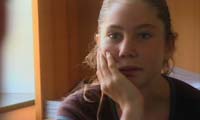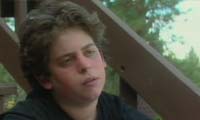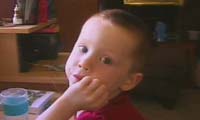This is the story of how I found Jessica, Jacob and DJ.
Jessica
We met Jessica at a Chinese restaurant in a strip mall somewhere in West Virginia. Dr. David Axelson, a child psychiatrist and director of the University of Pittsburgh Bipolar Center, had put us in touch. He was concerned about having us film one of his patients and worried about the impact on Jessica, but she was adamant that being in a documentary about bipolar kids was an excellent idea. She told us over bites of sweet and sour shrimp, "I want other kids to know what it's like to be me." She was sick of years of being misunderstood and taunted by her school mates.

Jessica was most candid that day. She wanted to share everything. Her dreams of becoming a singer, her love of Hannah Montana, her problems making friends at school, her fears about having a father deployed to Iraq. I found her striking. She was self possessed, and yet totally vulnerable.
Jessica did not recall the days before being medicated, but she seemed to sense that hers was a life that could not be lived without doctors or medications. Her mother, a wonderfully warm-hearted woman, regaled us with stories about Jessica's first five years off medications. We learned that Jessica would scream for eight hours at one go; that she refused to fall asleep unless her parents followed a very strict pattern of opening and closing doors and saying certain bedtime phrases exactly the same way night after night. If anything was done differently, Jessica would scream the whole night long. She would also become violent at times, attempting to hurt her little sister one moment and threatening to kill her parents with a kitchen knife the next.
It sounded extreme, but I too remembered my own childhood tantrums, which reputedly lasted hours, and the stories of my own eccentricities -- the times I chased my little sister down a corridor with a pair of scissors -- and I wondered what this diagnosis meant. Had Jessica watched violent shows on television? Had she been abused by someone in day care? Would she have outgrown this behavior in time? It's easy to second guess when you are first learning about this illness.
A few weeks later, Dr. Axelson shared a video he had taped years earlier, when Jessica was five years old. It was an exceptional piece of footage. Child psychiatrists spend a lifetime listening to parents describe a manic episode, but few patients display these symptoms in a doctor's office. Even to my untrained eye, Jessica seemed to be displaying strange behavior. She was talking quickly, she was extraordinarily giddy and seemed obsessed with "busting heads" and "slicing throats." In the tape, her parents describe Jessica's behavior alternating widely between two poles. One week she'd be unable to get out of bed, would refuse to get dressed or even eat, and the next week Jessica would be extremely elated, energetic, unable to stop talking or to even sleep -- the classic tell-tale signs of manic-depression, or bipolar.
The first thing we ever filmed with Jessica was a scene of her singing in her bedroom. She placed a CD of Hannah Montana in an old deck and -- completely off tune--- crooned the words to "Just Like You" at the top of her lungs. "Underneath it all, I'm just like you..I don't want to be treated differently" went the lyrics. It's the kind of raw, intimate footage that one rarely gets after weeks of filming. Jessica let us into her world the minute the camera started rolling.
Jacob

We weren't expecting to meet a child like Jacob. Child psychiatrist Dr. Marianne Wamboldt, with Denver Children's Hospital, had arranged for us to film her with one of her patients. We figured we'd use the footage as B-roll, the kind of innocuous shots one uses to introduce someone in a film.
Dr. Wamboldt closed the door to her office. Jon, our cameraman, hid at one end of the room. Steve, our soundman, lowered a boom. I slid near the door hoping for the scene to unfold naturally. I figured Dr. Wamboldt would ask us to leave the minute the real therapy session began.
Instead, we were allowed to stay. Jacob mumbled as he talked to Dr. Wamboldt. It was hard to understand everything he said, but we were totally absorbed by this 16-year old boy who was rolling his head. The session felt intimate despite the fact that three strangers were listening in on the drama of Jacob's life -- his angst over the start of school, his concerns over the side effects of the medication, his desire to help Dr. Wamboldt figure out the perfect combination of drugs to treat his symptoms.
The session ended and Jacob invited us to follow him some more. The next day we arrived at his home in the mountains of Colorado. I was struck by his family, their resilience and optimism despite years of struggling to help their son.
The Solomons described the chaos of living with a bipolar child. "You never know what child is going to get out of bed in the morning," they told me. I never saw Jacob's rages, his bouts of severe depression. Jacob's mood seemed to lift when the camera was around.
I came to know Jacob through years of home video that arrived at my office in New York City. The Solomons sent a hundred hours of precious moments: Jacob's first birthday, his first Hanukah, his second birthday, his first day at pre-school, his trip to Disneyland, his first school play, Halloween, summer vacations, and even more birthdays.
The Solomons filmed everything. And then suddenly, sometime around his eighth birthday,when he was stripped off all his meds and hospitalized, the Solomons stopped filming. The next time they picked up the camera, it was on Jacob's thirteenth birthday. That day he woke up, felt a stiffness in his neck, rolled his head and never stopped.
DJ

Every child psychiatrist we spoke to during the making of this documentary told us that they were seeing younger and younger children in their daily practice. There was confusion among many as to the age of onset of bipolar, but several doctors told us it was possible to identify bipolar in a child as young as three. We were determined to include a toddler amongst the cases we profiled, and spent several weeks going from doctor office to doctor office, hoping someone would introduce us to a toddler.
Dr. Patrick Bacon was one of the most thoughtful doctors we'd encountered in the Denver area. He was soft-spoken, but candid and forthright. One day while we were driving around Denver meeting doctors, he called and said that the family of a four year old he suspected was bipolar was willing to meet with us.
We arrived at the Koontz family and I was immediately overwhelmed. I sat on a couch with Cristina as her two toddlers jumped on top of me and howled with laughter. They were rambunctious, energetic children and I was exhausted after just an hour in their living room. Cristina was at her wits end. She was bone tired from all the screaming, crying, shouting. She looked like she was on the verge of crying.
I wasn't sure what to make of the situation. DJ was on four heavy duty medications and seemed extremely well adjusted and happy, but he could barely talk, and when he did, he repeated the same words over and over. When he played with his toy car, he would become obsessed with its wheels. Was this bipolar? Obsessive compulsive disorder? Autism? Or simply the case of a little boy who was a little different. Was I falling into the trap of trying to fit his behavior into some diagnostic box?
We filmed DJ for a few days then, and when we returned a month later, we found a different boy. After a month on a new drug regimen, DJ seemed completely changed. He was talking in full sentences, he was playing calmly and seemed to be very happy and well adjusted. Even Cristina was looking rested and at ease. I asked Cristina what was different and all she could think of was that DJ's dose of Trileptal had been upped.
We followed Cristina to Dr. Bacon one more time. Even though DJ was doing so well, Dr. Bacon increased his medications one more time. A few weeks later I called Christina who reported that DJ's mood had spiraled downward. I could hear DJ having a tantrum in the background.
home . introduction . watch online . frequently asked questions . interviews . a parents' guide . join the discussion
producer's chat . reporting this story . site map . dvd & transcript . press reaction
producer's journal . credits . privacy policy . journalistic guidelines . FRONTLINE series home . wgbh . pbs
posted january 8, 2008
FRONTLINE is a registered trademark of wgbh educational foundation.
main photograph © corbis, all rights reserved
web site copyright WGBH educational foundation
![The Medicated Child [home page]](../art/blank.gif)